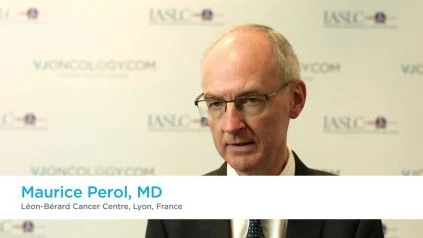Maurice Pe?rol, MD, Léon-Bérard Cancer Centre, Lyon, France talks about angiogenesis inhibition in lung cancer across treatment lines. VEGF pathway activation in tumors leads to new vessel development in tumors, or angiogenesis. Several inhibitors of this pathway are used in the treatment of non-small cell lung cancer (NSCLC). In first line, bevacizumab is the only approved drug for NSCLC and consistently improves the response rate and the progression-free survival (PFS) for patients treated with platinum-based chemotherapy, albeit with a smaller effect on overall survival (OS). In second line, two angiogenesis inhibitors have recently been developed; ramucirumab and nintedanib. Ramucirumab, a monoclonal antibody against VEGF, has demonstrated a significant improvement in response rate, PFS and OS in combination with docetxel in both squamous and non-squamous histologies. Nintedanib is a TKI targeting VEGFR and has shown to improve PFS and OS in adenocarcinoma. Dr Pe?rol also talks about the ULTIMATE study assessing the combination of weekly paclitaxel and bevacizumab in a second line setting. This regimen is well tolerated and provides a large increase in response rate and PFS which is useful in second line setting, especially for frail patients. Dr Perol highlights that for patients with aggressive disease and low levels of PDL-1 expression, there is a very high risk of disease progression with current immunotherapies such as nivolumab. In such patients chemotherapy combined with an anti-angiogenesis agent is probably a safer treatment regimen as it presents a lower risk of disease progression.
Recorded at the 2016 World Conference of Lung Cancer (WCLC) of the International Association for the Study of Lung Cancer (IASLC) in Vienna, Austria.
[the_ad id="32629"]

